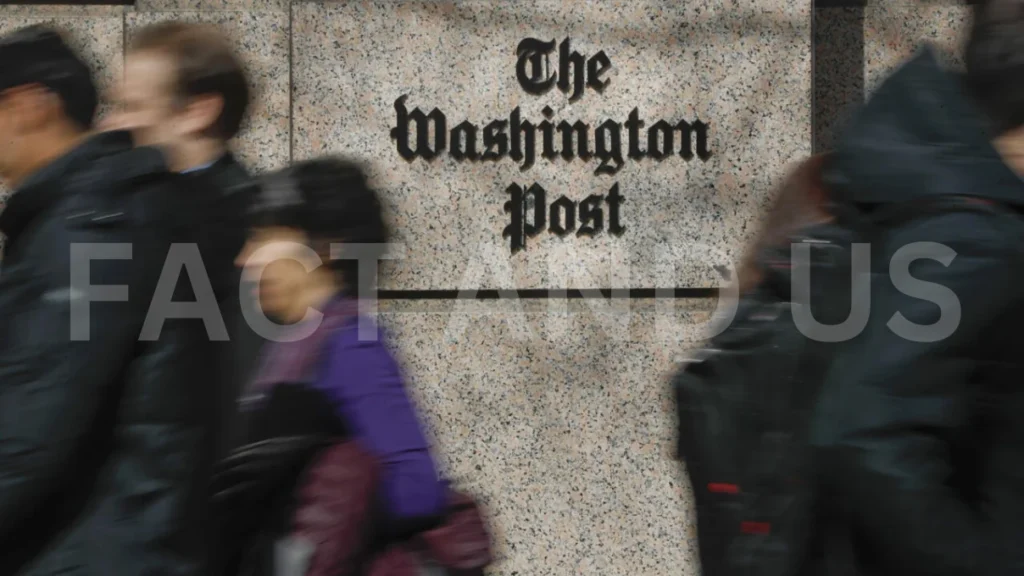Backlash Erupts After Washington Post Refuses to Endorse Presidential Candidate

The newspaper said in a statement that it will not endorse a presidential candidate for this election, the move creating uproar among some employees and subscribers of The Washington Post. Chief Executive Officer William Lewis explained the decision was a return “to our roots of not endorsing presidential candidates” and that the newspaper was ending the practice going forward.
It breaks with decades of tradition: the paper has endorsed a candidate in most presidential elections since the 1970s-all of whom have been Democrats. The leadership of the Washington Post Guild, which represents workers at the paper, expressed its “deep concern” with the decision.
The newspaper – in its own news article on the move – quoted two sources briefed on the sequence of events who were not authorized to speak publicly that editorial page staffers had drafted an endorsement of Harris that was not published.
Further, it discussed the same sources and pointed out that not publishing the endorsement was the owner of the paper, Amazon founder Jeff Bezos. In an article posted in the The Post’s website, Mr Lewis acknowledged: “We know that this will be interpreted in all kinds of ways, some of which will be intended, such as a tacit endorsement of one candidate, or a condemnation of another, or an abdication of responsibility. That is inevitable.”.
“We don’t view it that way. We view it as consistent with the values The Post has always stood for and what we hope for in a leader.”He added that it was also “a statement in support of our readers’ ability to make up their own minds” on who to elect president.Marty Baron, former executive editor of The Post, described the decision as “cowardice, with democracy as its casualty”.
Contents
A Divided Public Reaction”Backlash”
Responses to the Post’s decision have been swift and divided. Endorsement purists believe that the press helps readers to know more about candidates’ policy, character, and qualification. Detractors say they liked the Post choice; endorsements often reflect subjective bias more than objective guidance of editorial boards.
Political scientist Dr. Carla Morales said the implications: “It’s a tradition for media to endorse candidates, and when they are not endorsing anyone, it’s a sign that journalists have no confidence in any of them. That can psychologically affect the undecided voters or the ones seeking direction.
Readers took to social media to chime in on the decision, with some lambasting what they describe as an abandonment of civic duty and others hailing the newspaper for giving up partisan endorsement-a move which they say spurs further polarization. “If the Post won’t take a stand, what does that say about the state of this election?” one reader wrote.
Impact on Election Coverage
The Washington Post in previous elections has endorsed candidates with detailed analyses on why it believes one of the candidates is more worthy to be president. While sometimes debatable, endorsements have been a staple for readers. Without recommendation, voters may miss the deeper issue-oriented perspectives that come with endorsement.
Former Post editor Daniel Breckenridge said the move might be a response to increased scrutiny on mainstream media. “Media trust has been eroding for years. The Post’s decision may be an attempt to regain trust by not belonging to any political camp,” he said. “Still, it risks being seen as passive, especially at a time when so many readers are looking for clear stances on issues that matter.”
The Changing Role of Media in Politics
The backlash that has emerged regarding Post’s move highlights the changing expectations of media organizations and their role in determining public opinion. Newsrooms around the country faced criticism about the political bias they had, changing media consumption patterns among readers wanting outlets that share the same values.
Very many people have cherished the announcement of The Washington Post’s endorsement choices over election seasons because they come laden with much crucial information on key policies, personality traits of leaders, and candidate backgrounds. Without an endorsement from this publication, some readers may turn to other sources that surely will leave a gap in the landscape of traditional media.
What Lies Ahead for Political Endorsements?
As election day looms closer, the Post’s decision has spurred greater questions over just how different media will be in the future of endorsements. Some expect other influential news outlets to do the same, while others believe the practice of endorsement is too central to American journalism to die off entirely. In any event, The Washington Post’s break from this precedent illuminates exactly how media institutions are rebalancing their power in a digital world marked by doubt and disintegration.
In a follow-up statement, the Post’s editorial board clearly restated their commitment to reporting the policies of each candidate fairly and rigorously, promising readers a strong, well-rounded coverage of an election without advancing any particular agenda. Whether this will be enough to satisfy readers remains to be seen, but one thing is for sure: the paper’s decision has sparked a new debate regarding the responsibility of journalism in a time of profound political change.
The Washington Post has resolved not to endorse a candidate for the presidency in the upcoming election, and some of its employees and subscribers are outraged. However, the decision announced by Chief Executive William Lewis describes it as a return “to our roots of not endorsing presidential candidates” and that, going forward, the newspaper would end that practice.
The endorsement breaks with decades of tradition, since the paper has endorsed a candidate in most presidential elections since the 1970s – all of whom have been Democrats. Representatives at the Washington Post endorsed workers said they were “deeply concerned” by the decision.
The Washington Post said, in an article about the decision-according to two sources briefed on the sequence of events, though not authorized to speak publicly-that editorial page staffers had drafted an endorsement of Harris that was not published.
It cites the same sources, but adds that the move not to publish the endorsement was taken by the paper’s owner, Amazon founder Jeff Bezos. In a column published on The Post’s website, Mr Lewis said: “We recognize that this will be read in a range of ways, including as a tacit endorsement of one candidate, or as a condemnation of another, or as an abdication of responsibility. That is inevitable.”.
“We don’t see it that way. We see it as consistent with the values The Post has always stood for and what we hope for in a leader.” He also added that it was “a statement in support of our readers’ ability to make up their own minds” on whom to elect president. Former executive editor of The Post Marty Baron labeled the decision “cowardice, with democracy as its casualty”.
stay connected with fact and us for more such news.
